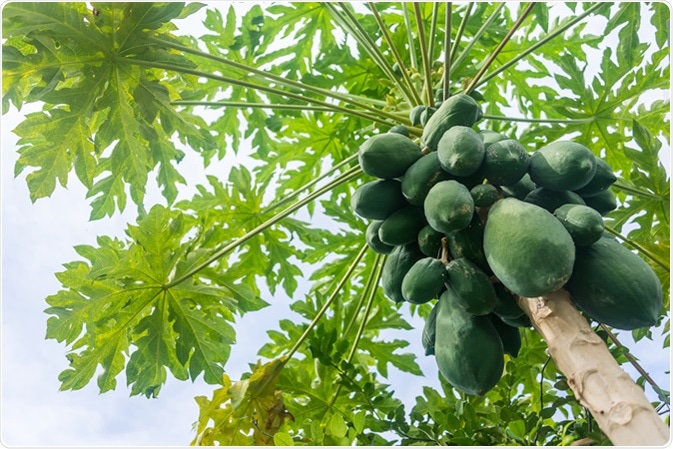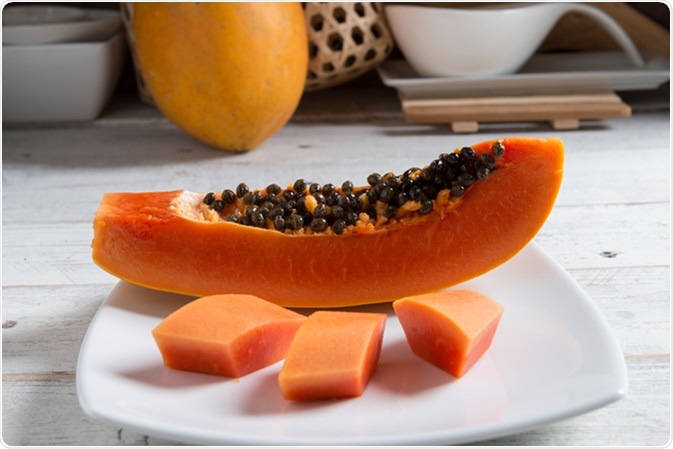The papaya, or pawpaw, botanically known as Carica papaya, is a common and delicious tropical fruit, and is of economic significance in many parts of the world. It grows on a perennial tree, which grows to about 2-10 m with large palmate leaves growing out as a crown from the top, while older leaves fade and drop off from the bottom. The trunk is hollow and comparatively soft. Its origin has been traced to Central America, but it is now indigenous to most tropical regions.
The plant is notable for the high content of latex, secreted by lactiferous cells found in most of the plant’s tissues. It is a white milky substance and can be quite caustic. The latex contains several endopeptidase enzymes, namely, papain, chymopapain, glycyl endopeptidase and caricain. The fruit has been used as medicine in various forms, both ripe and unripe forms.

The papaya tree with fruits. Image Credit: Worayoot Wongnin / Shutterstock
Nutritional Content
One papaya of medium size is a storehouse of various vitamins, minerals, antioxidants and other healthy nutrients. It yields about 120 calories, from about 30g of carbohydrates. Of this, 5g is comprised of fiber and 18g sugar. There are only 2g of protein, but many vitamins, such as folate, vitamin A, magnesium, copper, and pantothenic acid, as well as the B complex, including the carotenes (alpha and beta), lutein and zeaxanthin pigments, tocoferols, lycopene and vitamin K. It is also rich in calcium and potassium.

Papaya fruit. Image Credit: Regreto / Shutterstock
Specific Benefits
Vision: Zeaxanthin is a powerful antioxidant found in papaya flesh, which is involved in normal vision. It filters out ultraviolet rays and protects retinal cells from damage, especially age-related macular degeneration.
Asthma: Beta-carotene is also abundant in papaya and helps to counter asthma with a higher consumption.
Cancer: Cancer development is also inhibited with a higher consumption of beta-carotene beginning at a younger age. Papaya ingestion as part of a full and varied diet containing plenty of fruits and vegetables is linked to a lower incidence of several cancers, such as colorectal and prostate cancer.
Bone health: Vitamin K is important in maintaining good bone health and adequate intake is required to improve the absorption of calcium and reduce urinary loss of calcium as well. Low levels increase the incidence of bone fractures. Papaya intake thus helps to maintain strong bones.
Glucose control: Again, diabetics are favorably influenced by the ingestion of papaya due to the low sugar and high fiber content of this fruit. It is able to help with the modification of the glycemic and lipidemic profiles of the patient, as well as the insulin secretion, thus restoring the metabolic picture back towards the normal end.
Digestion: Digestion problems are also aided by including papaya in the diet, because it contains papain, an enzyme powerful enough to tenderize meat, and which helps prevent symptoms due to indigestion. The high fiber and water content also aids in assisting digestion, promoting intestinal motility and helping to regularize and soften stool passage.
Heart disease: The significant contribution of fiber, antioxidants and potassium also make papaya even more attractive to those at risk of heart disease. Lowering the sodium and increasing the potassium is among the most significant dietary changes to control the risk of cardiovascular disease. In animals it has been shown to oppose adrenergic alpha receptors and thus lower the blood pressure.
Anti-inflammatory: The antioxidants and vitamins in papaya also prevent chronic inflammation. The choline content, for instance, helps to strengthen memory pathways, and muscle development. It is also important for cell membrane integrity, nerve impulse transmission, fat absorption (and therefore fat-soluble vitamins absorption as well), and for good sleep.
Antibacterial: Mashed papaya is even good for healing skin wounds and has antibacterial action, because of papain and chymopapain. It can be used as a skin dressing for burns under clean conditions, and papain-containing ointments are useful in treating decubitus ulcers.
Skin and hair health: Papaya is also known to increase hair health, because of its vitamin A content, which is important for epithelial maturation in all parts of the body. Vitamin C (of which one medium papaya contains over twice the recommended daily intake) is also crucial, because it is involved in collagen synthesis, which is the basic structure of hair.
Others: The ripe papaya flesh helps to eradicate ringworm lesions, while unripe papaya is known to be an abortifacient by stimulating uterine contractions. It is also claimed to lower the blood pressure.
Further Reading
Last Updated: Feb 27, 2019